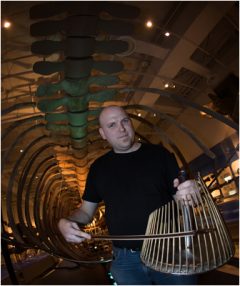
Jesse Stewart rehearses in Blue Whale skeleton at Canadian Museum of Nature for Nocturne performance. Photo by Brett Delmage
By: Emily Cook, TLS staff writer
For Professor Jesse Stewart, music-making is not an exclusive club; it’s a fundamental human right.
Stewart says he teaches students creative problem solving and interpersonal skills through the use of “found objects.” In one of his classes, you might find an ensemble of paper and cardboard instruments, a latex balloon orchestra, or instruments made of water.
“I try to create a space in my classes in which we can learn from one another and we can learn from and celebrate our differences,” says Stewart.
A Juno award winner, Stewart has taught in the music program at Carleton University since 2008. He has earned a number of honours along the way, including the 2013 Marston LaFrance Research Fellowship. In 2014, he was inducted into the Order of Ottawa, and this year, he added a Carleton Teaching Achievement Award to his long list of accomplishments.
Stewart says he sees his teaching as learner-centred, and focused on dialoguing and co-learning with students.
“I’m engaged in the process of learning in any classroom setting that I’m fortunate enough to be a part of,” he says.
Stewart also volunteers in the community and involves his students in those projects to help facilitate inclusive music learning outside school. He once hired students to work on an installation of recycled percussion instruments that formed an eight-foot cube. It was a project he was hired for by the National Capital Commission for Canada Day.
“That was part of their job, basically to facilitate the process of inclusive music-making among passersby,” he says.
Community engagement will also influence how Stewart uses the $15,000 grant from the Teaching Achievement Award. He plans to buy iPads to incorporate into his classes and other professional work.
He says he hopes to further develop iPad applications like the Adaptive Use Musical Instrument (AUMI), which translates movement into sound. Stewart says programs like this can help everyone create music.
“It’s the possibility of allowing people who may have experienced barriers to making music because of limited motor control or because of disability, providing opportunities for them to actually engage in music-making with other musicians,” he says.
Stewart says he sees the iPads as a way to bridge his work with students in the classroom to bigger issues in the wider community.
“I feel as a society we have a responsibility to ensure that everyone, including people with disabilities, including the poor, including people with no prior musical training, has an opportunity to make music.”